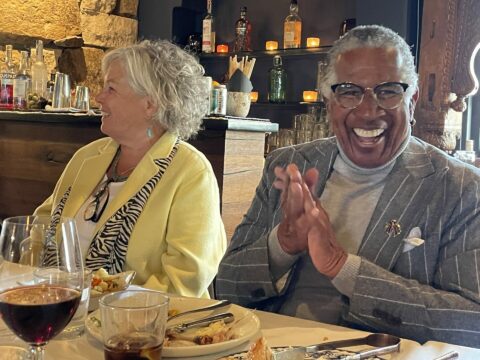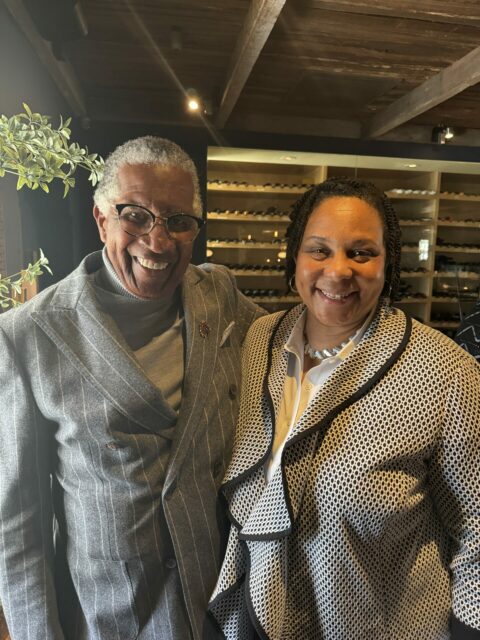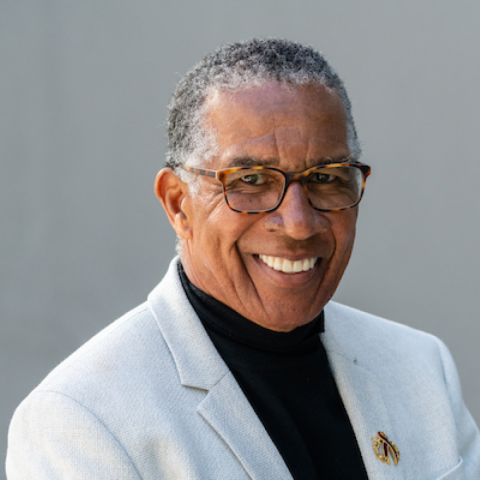This month, long-time board member James “Jimmy” Loyce concluded his board service with Metta Fund. Over the past eleven years, Jimmy has played an instrumental role in guiding our mission with invaluable insights and expertise. Not only has he contributed to the success and development of our organization, but he’s also helped deepen our impact as we strive towards advancing the health and wellness of older San Franciscans. With a steadfast focus on addressing disparities and advocating for underrepresented voices, Jimmy has helped shape the trajectory of our foundation.
A true public health and equity champion, Jimmy’s leadership has been an indispensable asset to Metta Fund, to San Francisco, and to the state of California. We are grateful for his time, commitment, humor, and the conversation-starting style he brought to the boardroom. Anyone who has met Jimmy knows he is one of San Francisco’s most dapper dressers!
As we express our gratitude for Jimmy’s exemplary service, we also celebrate the profound impact he has had on the landscape of public health. His legacy will continue to inspire us to push boundaries, challenge inequities, and strive for a future where everyone can thrive and age with dignity.
In celebration of his legacy, we took the opportunity for an informal question-and-answer session so Jimmy could share his insight about his time with Metta Fund.
1. You served as a board member at Metta Fund for 11 years. How did you first get involved with Metta Fund?
I learned about Metta Fund from former board members Sandy Mori and Beverly Hayon, both of whom I worked with in the 1990s at San Francisco’s Public Health Department during my time as senior administrator and later as Deputy Director of Health. I have actually known Sandy Mori through community work since the 1970s. In 2013, Metta Fund was looking for board members from the public health field, which is when I was appointed to serve.

2. Halfway through your board service, in late 2016, Metta shifted to a population focus on older adults. Why is this strategic focus important?
Metta Fund, as a health-conversion foundation, was a broad health funder when I first joined the board. We were investing in a variety of community health issues across the city. Sand Mori, the quiet yet forceful leader that she is, brought to the board the idea of a population focus – she had long been an advocate for older adults. And quite honestly, it was a no brainer. The limited funding going to the growing older adult population in San Francisco was – and is – concerning. And all of us at the board were older adults, so we happily approved this strategic direction, knowing we could make an impact.
3. Why is aging an equity issue?
Aging intersects with equity on various fronts, primarily due to systemic racism and disparities in access that are exacerbated as we grow older. Aging is as an equity issue because elders of color often face economic and healthcare access disparities, not to mention housing insecurity and inadequate living conditions, which is on grand display here in California. And housing is directly linked to social isolation. Social connectedness plays a vital role in healthy aging, yet many older folks face social isolation because of a loss of networks and community.

4. What role can philanthropy play in the effort to advance equity?
As we know, throughout history, communities of color have faced discrimination and marginalization. Earlier in my professional career, there was a complete absence of focus on racial equity. We had to really challenge the systems and the world view of decision-makers. And today, we see the outcome of centuries of disinvestment – just look at disparities in health and aging. Communities of color experience higher rates of illness and death across a wide range of conditions. Philanthropy provides an avenue to address these historical injustices by directing resources to nonprofits and groups that tackle these issues. At the same time, philanthropy can serve as a platform to amplify the voices of communities who have faced injustice. And to fund movements. Philanthropy can contribute to righting the wrongs of yesterday. We must do the hard work. Like my grandmother, ‘Big Mama” used to say: “If you’re not willing to work from can’t-see-in-the-morning to can’t-see-at-night, you’re not willing to work.” And for philanthropy, that starts by funding with a racial equity lens and ensuring that decision-makers reflect those we seek to impact.
5. What’s one piece of advice you have for us, here at Metta Fund?
We do serious work, but at some point, you have to inject humor. Humor is helpful to our health and promotes connection and resilience. We have to inject smiles into our work.We do serious work, but at some point, you have to inject humor.
Indeed, Jimmy has brought us smiles for many years as a mentor, a collaborator, and a friend to many. His support and guidance have nurtured a culture of empathy and collaboration. Though he may be stepping down from his official role at Metta, his spirit is woven into the fabric of our foundation. We extend our heartfelt thanks and best wishes for his travels ahead with his wife, Nancy. Thank you, Jimmy, for your unwavering dedication, your tireless advocacy, and your profound impact on Metta Fund and the communities we serve. You have truly made a difference, and your legacy will continue to inspire us.
With deepest gratitude, the Metta Fund team.
